Affiliate links on Android Authority may earn us a commission. Learn more.
MediaTek chip guide: All you need to know about MediaTek processors
Published onNovember 25, 2024
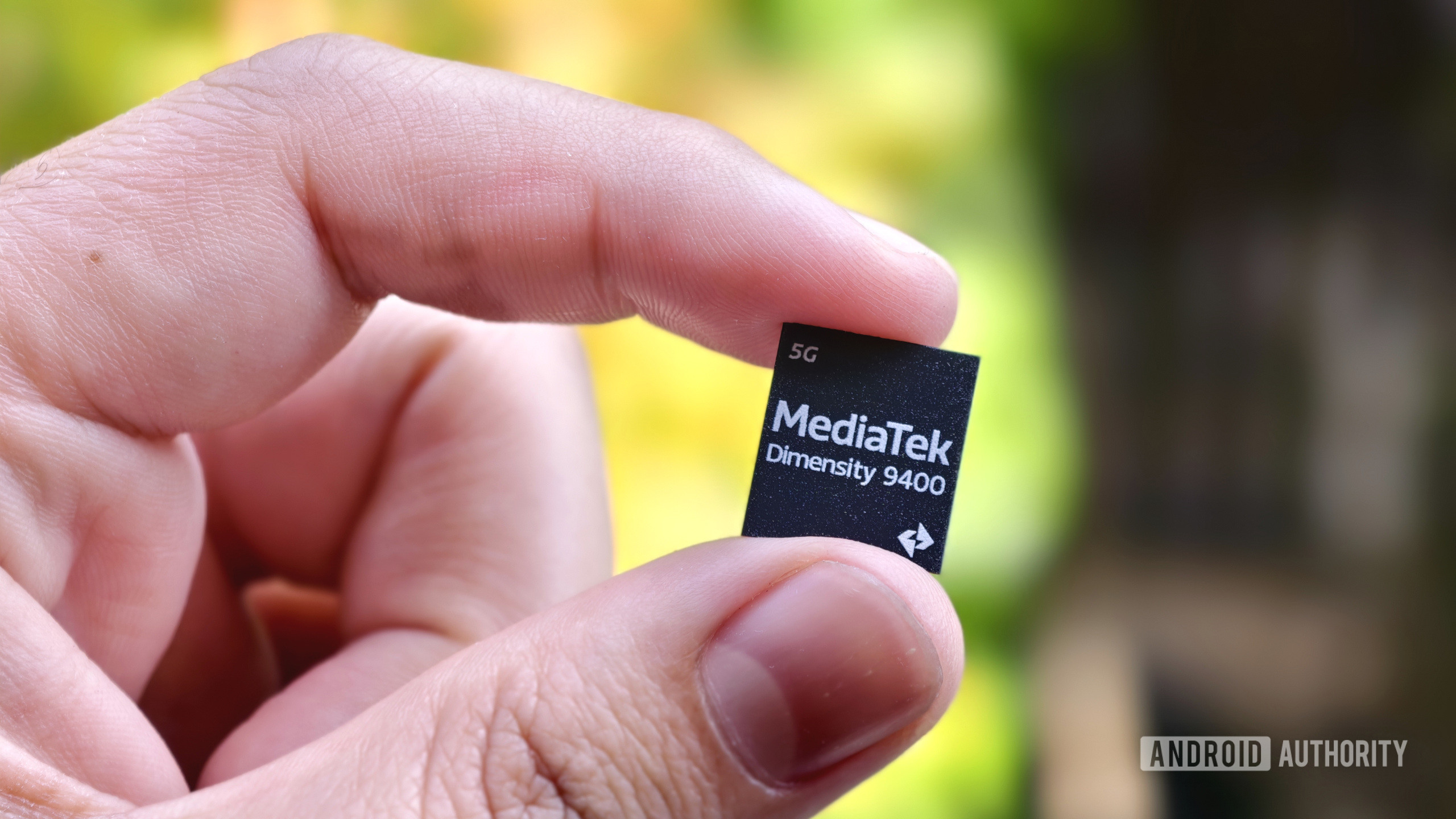
Taiwan-based MediaTek used to play second fiddle to silicon rival Qualcomm, but the company is now the number one chipmaker globally. And some of the Taiwenese company’s chips even feature on our list of the best mobile processors. Figuring out the naming conventions and capabilities of these MediaTek processors can be a little daunting, though.
Don’t fret, as our MediaTek chipset guide tries to break things down for you. Read on for all the information you’ll need on MediaTek processors.
Flagship MediaTek 5G chipsets: Dimensity 9000 series
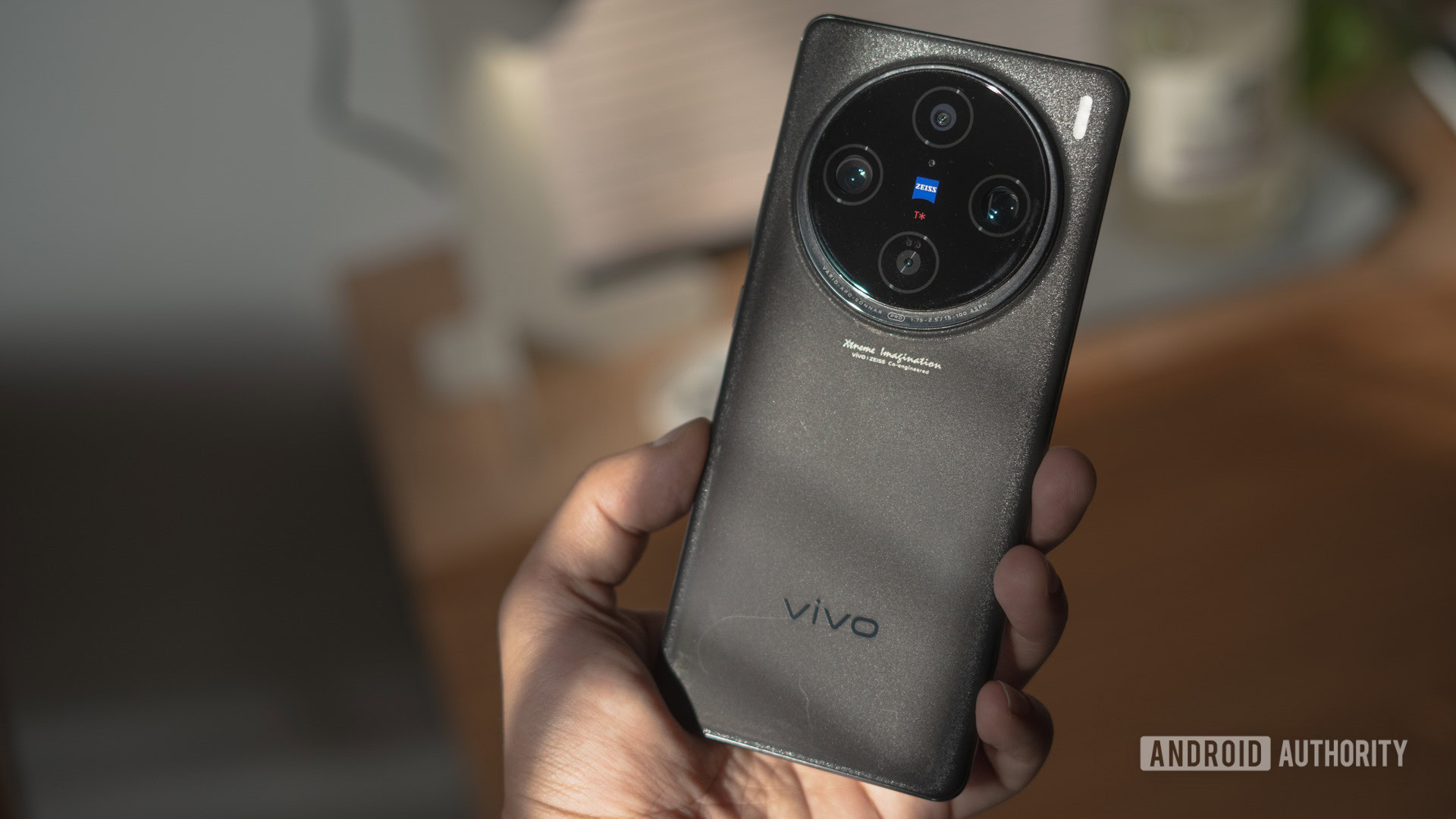
MediaTek’s latest and greatest flagship processor is the Dimensity 9400. This chip already powers a few notable high-end phones and will take the fight to the Snapdragon 8 Elite. The Dimensity 9400 sports a 3nm TSMC design for improved efficiency and performance, a powerful CPU that has a lot in common with its predecessor (1x Cortex-X925, 3x Cortex-X4, 4x Cortex-A720), and a flagship-grade Arm Immortalis-G925 GPU.
Other features worth knowing include support for a so-called Agentic AI Engine framework, 8K/60fps video capture capabilities (beating Qualcomm to the punch), and support for triple-screen foldable phones. The good news is that we’ve already tested one of the first phones with this chip, namely the OPPO Find X8 Pro. We discovered that the processor was a notable CPU upgrade over the previous chip but still lagged behind Apple and Qualcomm’s best. Fortunately, the OPPO phone was a match for the Snapdragon 8 Elite-toting ROG Phone 9 Pro when it came to graphical performance while actually running cooler. So we’re keen to see how other Dimensity 9400-toting phones perform.
The Dimensity 9400 doesn't quite beat the Snapdragon 8 Elite for CPU performance, but GPU performance is another matter.
MediaTek’s previous flagship processors were the 4nm Dimensity 9300 and Dimensity 9300 Plus. These chips were designed to take on the Snapdragon 8 Gen 3. This chipset eschewed little CPU cores entirely in favor of big and medium cores (four Cortex-X4 and four Cortext-A720 cores), while the Immortalis-G720 GPU was no slouch, either. The latter supports hardware-based ray tracing, much like Qualcomm’s silicon.
The Dimensity 9200 and Dimensity 9200 Plus landed in 2022 and are also important entries. Perhaps the main reason for that is because these were the flagship MediaTek chips to support mmWave 5G, coming a while after rival Qualcomm supported the fast but temperamental standard. These were also the first MediaTek processors to support hardware ray-tracing tech for more immersive graphics. Otherwise, the Dimensity 9200 series offered a powerful octa-core CPU (1x Cortex-X3, 3x Cortex-A715, 4x Cortex-A510), a capable Mali-G715 MC11 GPU, and cooling improvements.
| Dimensity 9400 | Dimensity 9300 | Dimensity 9200 | |
|---|---|---|---|
CPU Config | Dimensity 9400 1x Cortex-X925 @ 3.63GHz 3x Cortex-X4 @ 3.3GHz 4x Cortex-A720 @ 2.4GHz | Dimensity 9300 1x Cortex-X4 @ 3.25GHz 3x Cortex-X4 @ 2.85GHz 4x Cortex-A720 @ 2.0GHz | Dimensity 9200 1x Cortex-X3 @ 3.05GHz 3x Cortex-A715 @ 2.85GHz 4x Cortex-A510 1.8GHz |
GPU | Dimensity 9400 Arm Immortalis-G725 12-core Hardware ray-tracing | Dimensity 9300 Arm Immortalis-G720 12-core Hardware ray-tracing | Dimensity 9200 Arm Immortalis-G715 11-core Hardware ray-tracing |
Caches | Dimensity 9400 12MB L3 10MB system-level cache | Dimensity 9300 8MB L3 10MB system-level cache | Dimensity 9200 8MB L3 6MB system-level cache |
AI | Dimensity 9400 NPU 890 Agentic AI Engine | Dimensity 9300 APU 790 (added INT4 support and hardware compression) | Dimensity 9200 APU 690 |
RAM support | Dimensity 9400 LPDDR5X @ 10,667Mbps | Dimensity 9300 LPDDR5T @ 9600Mbps | Dimensity 9200 LPDDR5X @ 8333Mbps |
Storage | Dimensity 9400 UFS 4.0 with MCQ | Dimensity 9300 UFS 4.0 with MCQ | Dimensity 9200 UFS 4.0 with MCQ |
4G/5G Modem | Dimensity 9400 LTE/5G (integrated) Sub6GHz and mmWave 7,000Mbps down (sub-6GHz) | Dimensity 9300 LTE/5G (integrated) Sub6GHz and mmWave 7,900Mbps down | Dimensity 9200 M80-based LTE/5G (integrated) Sub6GHz and mmWave 7,900Mbps down |
Other networking | Dimensity 9400 Bluetooth 6 Wi-Fi 7 | Dimensity 9300 Bluetooth 5.4 Wi-Fi 7 | Dimensity 9200 Bluetooth 5.3 Wi-Fi 7 Ready |
Process | Dimensity 9400 TSMC 3nm N3P | Dimensity 9300 TSMC 4nm+ N4P | Dimensity 9200 TSMC 4nm N4P |
We haven’t seen a ton of flagship phones with Dimensity 9000 series chips as many brands still prefer Qualcomm for their high-end devices, particularly in the US. In saying so, MediaTek gained a big win in late 2024 when the Galaxy Tab S10 series launched with the Dimensity 9300 Plus chip. Furthermore, there are a handful of high-end phones offering Dimensity chips in global markets.
Notable flagship devices:
Mid-range MediaTek 5G chipsets
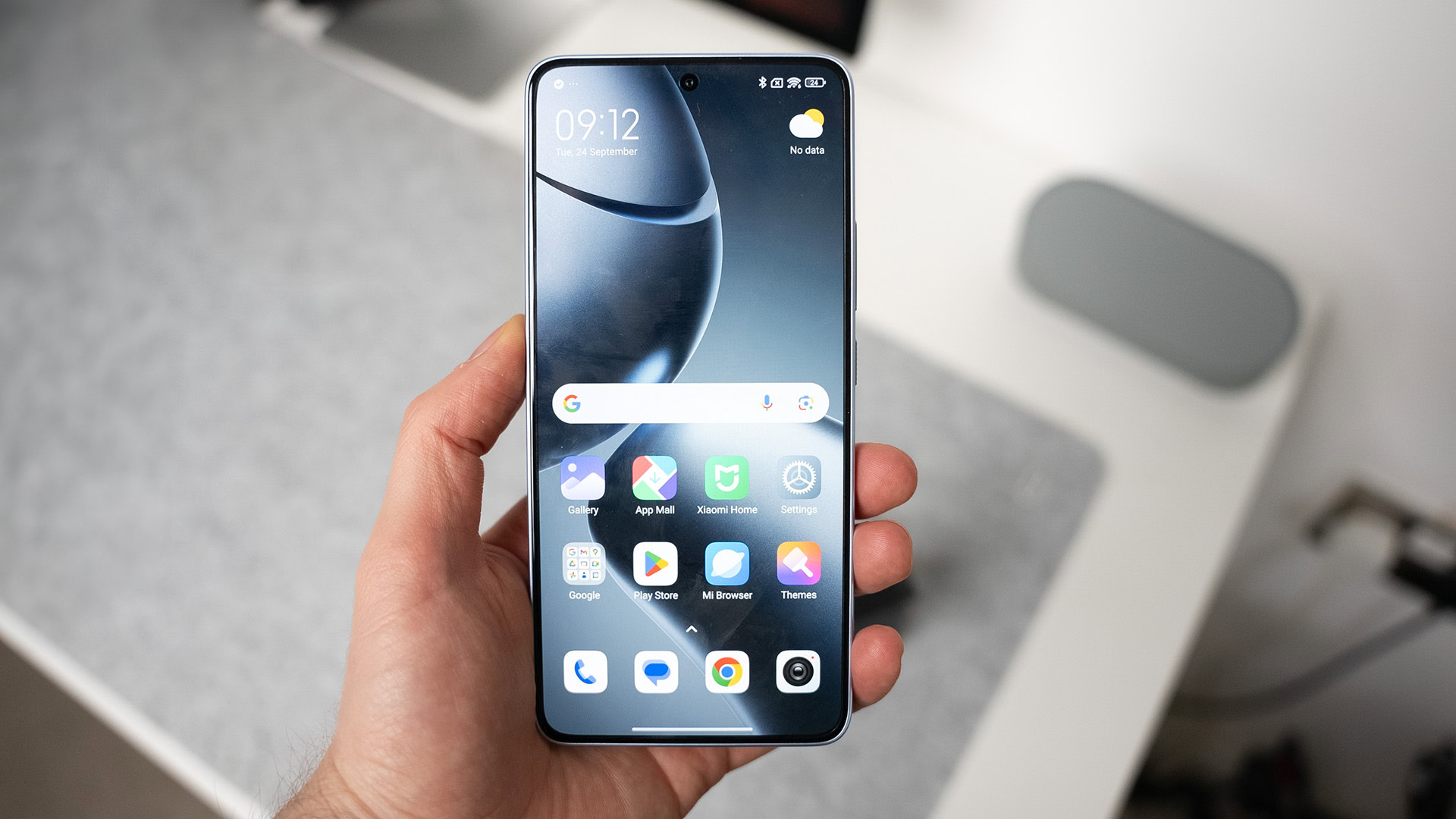
The most prominent mid-range processor from MediaTek is the Dimensity 8300, announced in November 2023. It’s effectively an upgrade over the previous Dimensity 8200. The CPU offers 1x Cortex-A715 @ 3.35GHz, 3x Cortex-A715 @ 3GHz, and 4x Cortex-A510 2.2GHz cores. That’s roughly 20% more performant in CPU tasks. It gets even better in GPU workloads, where the Dimensity 8300’s Mali-G615 MC6 GPU offers a claimed 60% performance boost over the Dimensity 8200.
The chip also supports generative AI features, including the ability to run large language models (LLMs) and image generators entirely on the device. However, it’s up to device manufacturers and the likes of Google to incorporate these features in software. This processor isn’t quite on par with the rival Snapdragon 7 Plus Gen 3 SoC on paper, but it’s still a powerful mid-range SoC.
MediaTek also launched the Dimensity 8350, which seems to be an incremental upgrade over the 8300. Expect the same CPU, GPU, APU, and camera features, but the Taiwanese brand says it has a 4% and 13% boost to single-core and multi-core CPU performance, respectively. So, you really aren’t missing out if you opt for a Dimensity 8300 phone instead.
| MediaTek Dimensity 8300/8350 | MediaTek Dimensity 8200 | MediaTek Dimensity 8000/8100 | MediaTek Dimensity 8050/8020 | |
|---|---|---|---|---|
CPU | MediaTek Dimensity 8300/8350 1x Cortex-A715 3x Cortex-A715 4x Cortex-A510 | MediaTek Dimensity 8200 4x Cortex-A78 4x Cortex-A55 | MediaTek Dimensity 8000/8100 4x Cortex-A78 4x Cortex-A55 | MediaTek Dimensity 8050/8020 4x Cortex-A78 4x Cortex-A55 |
GPU | MediaTek Dimensity 8300/8350 Arm Mali-G615 MC6 | MediaTek Dimensity 8200 Arm Mali-G610 MC6 | MediaTek Dimensity 8000/8100 Arm Mali-G610 MC6 | MediaTek Dimensity 8050/8020 Arm Mali-G77 MC9 |
Modem | MediaTek Dimensity 8300/8350 5.17Gbps download Sub-6GHz | MediaTek Dimensity 8200 4.7Gbps download Sub-6Ghz | MediaTek Dimensity 8000/8100 4.7Gbps download Sub-6Ghz | MediaTek Dimensity 8050/8020 4.7Gbps download Sub-6Ghz |
Camera | MediaTek Dimensity 8300/8350 320MP single 32MP+32MP+32MP triple | MediaTek Dimensity 8200 320MP single 32MP+32MP+32MP triple | MediaTek Dimensity 8000/8100 200MP single 32MP+32MP+16MP triple | MediaTek Dimensity 8050/8020 200MP single 32MP+16MP dual |
Machine learning | MediaTek Dimensity 8300/8350 NPU 780 | MediaTek Dimensity 8200 APU 5.0 | MediaTek Dimensity 8000/8100 APU 5.0 | MediaTek Dimensity 8050/8020 APU 3.0 |
Process | MediaTek Dimensity 8300/8350 4nm | MediaTek Dimensity 8200 4nm | MediaTek Dimensity 8000/8100 5nm | MediaTek Dimensity 8050/8020 6nm |
Moving down a notch, MediaTek also offers the Dimensity 8200, 8050, and 8020 chips. Expect older CPUs and respectable mid-range or old flagship GPUs. So you should still get a good level of power if you buy a phone with these chips.
Notable phones:
- Motorola Edge 40
- POCO X6 Pro
- TECNO Phantom V Flip
- vivo V30 Pro
- Xiaomi 14T
Budget MediaTek chipsets
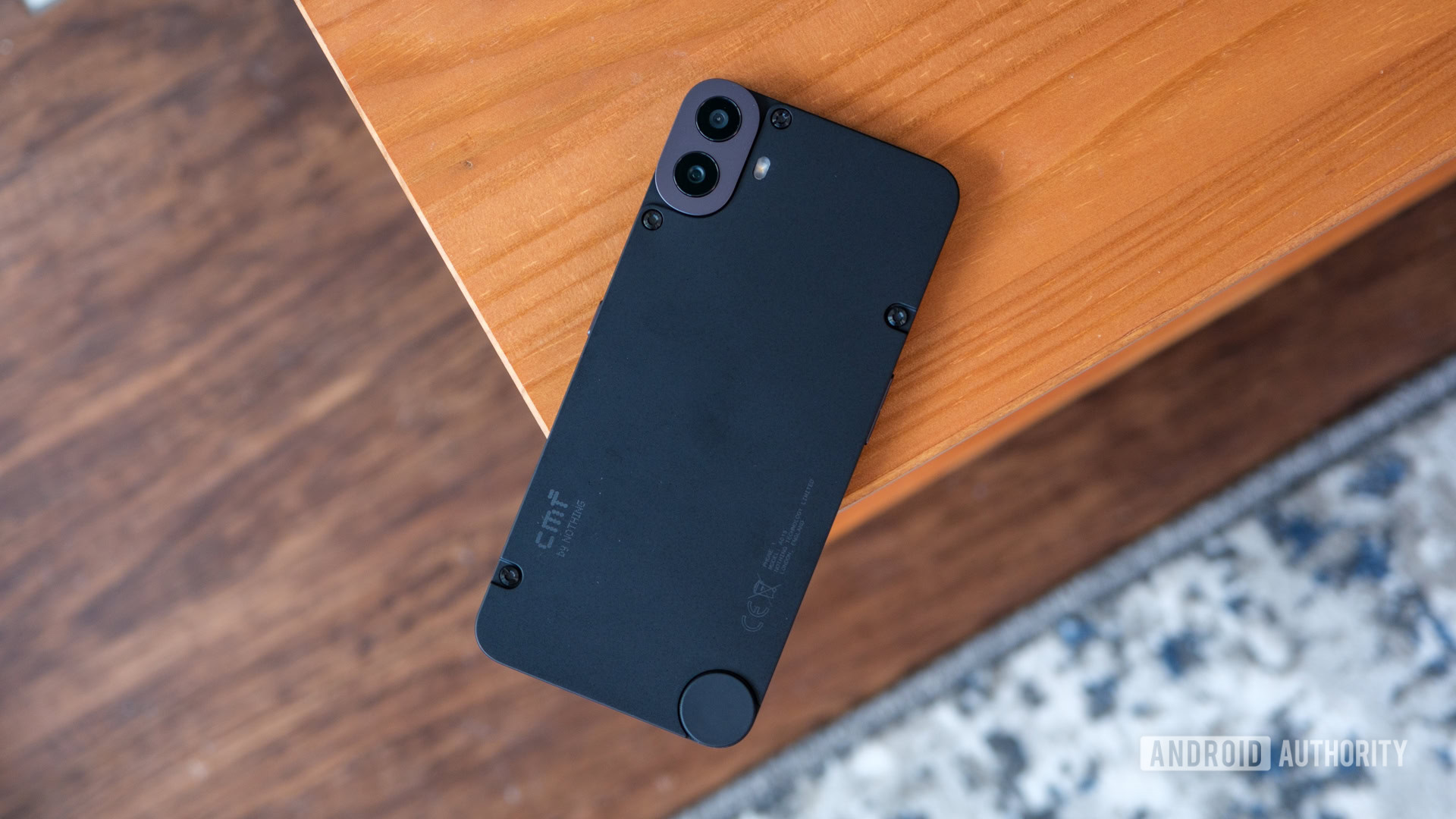
MediaTek also offers a host of more budget-focused 5G chipsets, all with middling or older CPUs and squarely mid-tier graphics. The MediaTek Dimensity 7350 is probably the best recent entry. The chip sports a relatively modern if unspectacular CPU (2x Cortex-A715, 6x Cortex-A510), an Arm Mali-G610 MC4 GPU, Bluetooth 5.3, and Wi-Fi 6E. It’s basically identical to 2023’s Dimensity 7200 save for a higher CPU clock speed (3GHz versus 2.8GHz) and slightly better AI silicon.
Meanwhile, the Dimensity 7300 and 7300X are a rung below the Dimensity 7350 in many ways. Expect an older CPU (4x Cortex-A78 and 4x Cortex-A55), the Mali-G615 MC2 GPU, slightly slower peak cellular speeds, but Bluetooth 5.4 instead of 5.3. All these mentioned chips also offer features like 200MP single-camera support, support for a 144Hz refresh rate, and 4K HDR capture. So they’re pretty well-rounded in terms of the feature-set.
MediaTek is rejigging its mid-range chips, with Dimensity 6000 and 7000 series processors now being a thing.
| MediaTek Dimensity 7350 | MediaTek Dimensity 7300/7300X | MediaTek Dimensity 6080 | MediaTek Dimensity 6020 | |
|---|---|---|---|---|
CPU | MediaTek Dimensity 7350 2x Cortex-A715 6x Cortex-A510 | MediaTek Dimensity 7300/7300X 2x Cortex-A78 6x Cortex-A55 | MediaTek Dimensity 6080 2x Cortex-A76 6x Cortex-A55 | MediaTek Dimensity 6020 2x Cortex-A76 6x Cortex-A55 |
GPU | MediaTek Dimensity 7350 Mali-G610 MC4 | MediaTek Dimensity 7300/7300X Mali-G68 MC4 | MediaTek Dimensity 6080 Mali-G57 MC2 | MediaTek Dimensity 6020 Mali-G57 MC2 |
Modem | MediaTek Dimensity 7350 Sub-6GHz 4.7Gbps | MediaTek Dimensity 7300/7300X Sub-6GHz | MediaTek Dimensity 6080 Sub-6GHz 2.77Gbps downlink | MediaTek Dimensity 6020 Sub-6GHz 2.77Gbps downlink |
Camera | MediaTek Dimensity 7350 200MP single | MediaTek Dimensity 7300/7300X 200MP single Dual TBC | MediaTek Dimensity 6080 108MP single 16MP+16MP dual | MediaTek Dimensity 6020 64MP single 16MP+16MP dual |
Machine learning | MediaTek Dimensity 7350 NPU 657 APU 650 (7200) | MediaTek Dimensity 7300/7300X APU 550 | MediaTek Dimensity 6080 TBC | MediaTek Dimensity 6020 TBC |
Process | MediaTek Dimensity 7350 4nm | MediaTek Dimensity 7300/7300X 6nm | MediaTek Dimensity 6080 6nm | MediaTek Dimensity 6020 7nm |
Two other recent releases are the Dimensity 6020 and 6080. These processors share features like an aging, low-power CPU (2x Cortex-A76 and 6x Cortex-A55), a Mali-G57 MC2 GPU, a sub-6GHz modem topping out at 2.77Gbps, and aging Wi-Fi 5 support. It also seems like these chips lack an APU for faster, more robust machine learning. The Dimensity 6080 differs from the 6020 by offering a smaller manufacturing process (6nm versus 7nm) and higher resolution camera support (108MP versus 64MP).
MediaTek also has a host of older budget 5G silicon in its portfolio, such as the Dimensity 700/720/900/920/930. These chips, which usually have 2+6 core CPU layouts and old mid-tier GPUs, have waned in popularity in favor of the aforementioned processors, though. The company did, however, release the Dimensity 6100 Plus last year, which is basically a modified version of these chips.
Nevertheless, these budget 5G chips have found favor with everyone from Motorola and Samsung to Nothing and Xiaomi. And Motorola has even used the Dimensity 7300 in its latest foldable phone.
Notable phones:
MediaTek’s 4G chips
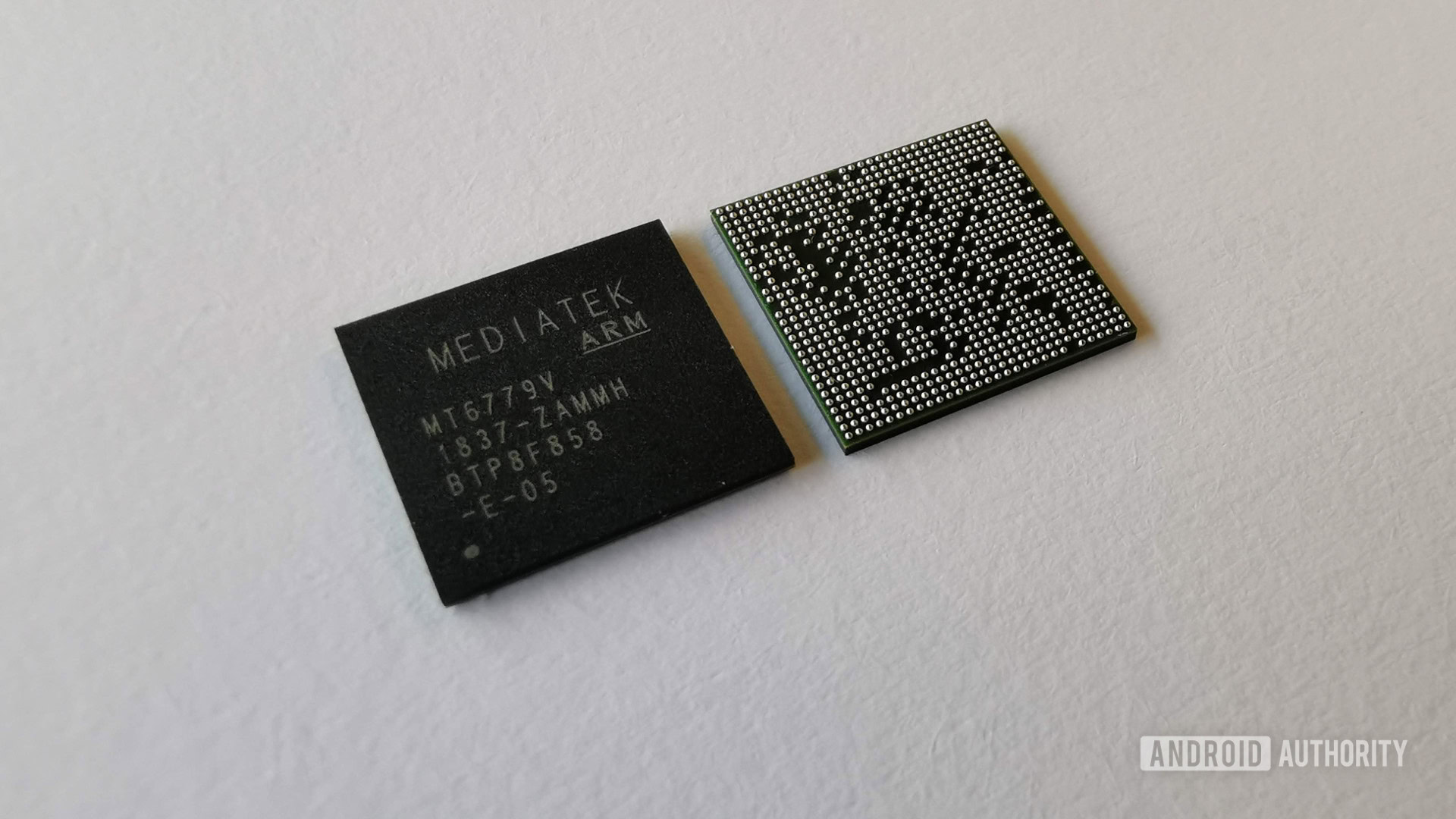
The company still offers 4G chipsets over five years after the first 5G phones were launched. The most capable chipsets here are the Helio G100, the G9x range, and the older Helio G8x series. Expect 2+6 core CPU setups here using Arm’s old Dynamiq technology, and very modest graphical performance. The Helio G100 and G99, in particular, stand out thanks to the small 6nm design for improved efficiency. By comparison, many of these low-end 4G chips are larger, less efficient designs.
These chips often power 4G variants of smartphones from Samsung, Xiaomi, and other brands. For example, the Galaxy A15 4G and Redmi Note 13 Pro 4G are powered by Helio G9x processors. However, the Helio G8x chips don’t really get used anymore.
| MediaTek Helio G100 | MediaTek Helio G99/G96 | MediaTek Helio G95 | |
|---|---|---|---|
CPU | MediaTek Helio G100 2x Cortex-A76 6x Cortex-A55 | MediaTek Helio G99/G96 2x Cortex-A76 6x Cortex-A55 | MediaTek Helio G95 2x Cortex-A76 6x Cortex-A55 |
GPU | MediaTek Helio G100 Mali-G57 MC2 | MediaTek Helio G99/G96 Mali-G57 MC2 | MediaTek Helio G95 Mali-G76 MC4 |
AI | MediaTek Helio G100 N/A | MediaTek Helio G99/G96 N/A | MediaTek Helio G95 APU 2.0 |
Camera | MediaTek Helio G100 200MP single 16MP+16MP dual | MediaTek Helio G99/G96 108MP single 16MP+16MP dual | MediaTek Helio G95 64MP single 24MP+16MP dual |
Connectivity | MediaTek Helio G100 Cat-13 LTE | MediaTek Helio G99/G96 Cat-13 LTE | MediaTek Helio G95 Cat-12 LTE |
Manufacturing process | MediaTek Helio G100 6nm | MediaTek Helio G99/G96 12nm 6nm (G99) | MediaTek Helio G95 12nm |
MediaTek also offered ancient Helio G35, G25, and A25 processors, featuring no big cores whatsoever and low-end PowerVR GPUs. The bad news is that smooth system performance wasn’t guaranteed with these chips. The good news is that Android phone makers have largely abandoned these SoCs for a while now.
Notable phones:
-
- Motorola Moto G72
- POCO M6 Pro
- Redmi Note 13 Pro 4G
- Samsung Galaxy A15 4G
That’s about it for our MediaTek chipset guide! We’ll be updating this article periodically to add new chipsets from the Taiwanese silicon designer.